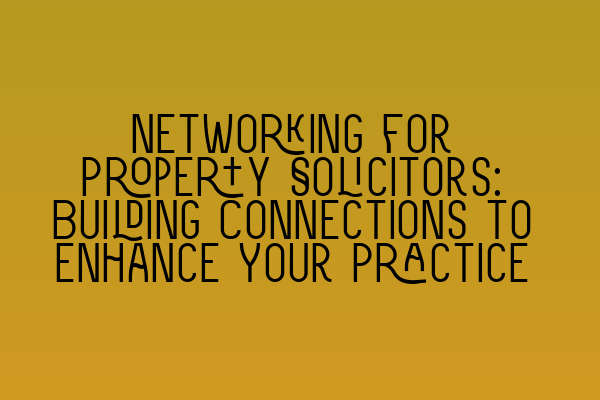Networking for Property Solicitors: Building Connections to Enhance Your Practice
In the competitive world of property law, it is essential for solicitors to not only excel in their legal knowledge and expertise but also to build strong connections within the industry. Networking plays a crucial role in developing and maintaining a successful practice. By building connections with other professionals, you can create opportunities, gain valuable insights, and enhance your reputation as a property solicitor. In this blog post, we will discuss the importance of networking for property solicitors and provide useful tips on how to build fruitful connections.
Why Networking Matters for Property Solicitors?
Networking is the key to successfully expanding your professional circle and creating a strong reputation in the property law arena. As a property solicitor, networking can bring numerous benefits to your practice:
1. Building a Referral Network: Networking allows you to connect with other professionals in the property industry, such as real estate agents, mortgage brokers, and surveyors. These connections can lead to referrals, expanding your client base and generating new business opportunities.
2. Staying Up-to-Date: Engaging with other property solicitors and industry experts through networking events, conferences, and online platforms can help you stay updated on the latest trends, changes in legislation, and best practices. This knowledge is invaluable in providing top-notch services to your clients.
3. Collaborating with Specialists: Networking opens doors to collaborate with specialists in related areas of law, such as tax advisors, construction lawyers, and environmental consultants. By forming mutually beneficial partnerships, you can offer your clients comprehensive legal solutions and strengthen your expertise in property law.
Effective Networking Strategies for Property Solicitors
Now that we understand the significance of networking, let’s delve into some tried and tested strategies to help you build connections and enhance your practice:
1. Attend Industry Events: Property law conferences, seminars, and workshops are great opportunities to meet like-minded professionals and expand your network. Make the most of these events by actively engaging in conversations, exchanging contact information, and following up with individuals afterward. Remember, a strong initial impression is crucial.
2. Join Professional Associations: Become a member of key professional associations in your field, such as the Law Society or the Property Law Association. These associations often organize networking events exclusively for their members, providing focused opportunities to connect with potential clients and industry leaders.
3. Online Networking: In today’s digital age, online platforms play a vital role in fostering connections. Engage with property law forums, LinkedIn groups, and online communities to share insights, ask questions, and showcase your expertise. Ensure your online profiles are up-to-date and present a professional image.
4. Offer to Speak at Events: Position yourself as an industry expert by offering to speak at property law events. Sharing your knowledge and experiences can help you gain visibility, establish credibility, and attract potential clients and colleagues. Additionally, presenting at events allows you to connect with other speakers and participants.
5. Follow Up and Stay Connected: After attending networking events or engaging in conversations, don’t forget to follow up with those you have connected with. Send personalized emails or LinkedIn messages to express your appreciation for the conversation and suggest staying in touch. Regularly connect with your network by sharing valuable content or by arranging informal catch-ups.
The Bottom Line
Networking is an integral part of building a successful property law practice. By actively engaging in networking activities and building meaningful connections, you can enhance your reputation, expand your client base, and stay ahead in the ever-evolving world of property law.
Remember, networking is a continuous process that requires dedication and perseverance. So, take the time to attend events, engage online, and follow up with your connections. By doing so, you will reap long-term benefits for your practice.
If you’re preparing for the SQE exams as a property solicitor, check out our related articles on SQE 1 Practice Exam Questions, SQE 1 Practice Mocks FLK1 FLK2, SQE 2 Preparation Courses, SQE 1 Preparation Courses, and SRA SQE Exam Dates. These resources will help you excel in your journey towards becoming a qualified property solicitor.
Building connections may require effort, but the rewards are worth it. Start networking today and unlock the potential for growth and success in your property law practice!
*[SQE]: Solicitors Qualifying Examination
*[SRA]: Solicitors Regulation Authority
